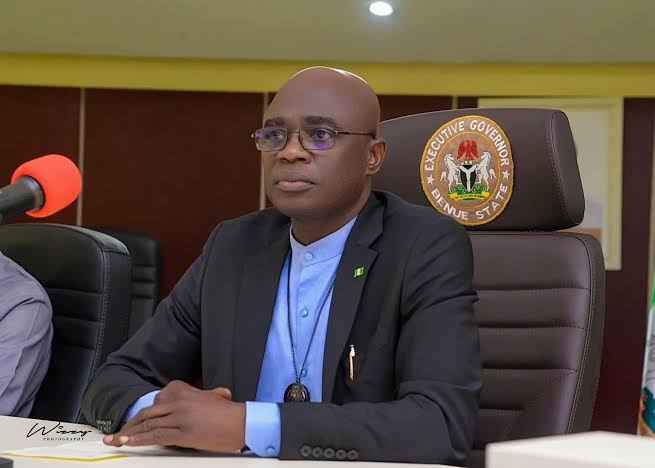News
Benue massacre: Governor Alia says killers behind recent attacks are foreigners

Benue State Governor, Hyacinth Alia, has claimed that the individuals responsible for the ongoing wave of killings in the state are not Nigerians.
Speaking during an appearance on Channels Television’s Politics Today, Governor Alia described the attackers as foreigners who speak strange languages and display behaviors unfamiliar to local communities.
The governor’s comments follow a series of deadly assaults across the North-Central state, which have left dozens of people dead and forced many others to flee their homes.
When asked about the identities of the perpetrators, Governor Alia emphasized the need to understand the nature of the threat before addressing its sources.
“Let’s have the narrative very correct. We know Nigerians—by our ethnicities, we can identify a Fulani man, a Yoruba man, a Hausa man—we know them. Even the regular traditional herders, we know them. They work with cows, herding with sticks,” Alia said.
READ ALSO: JUST IN : Benue gov cries out, says death toll from herdsmen attacks now 56
“But these folks [the attackers] are coming in fully armed with AK-47s and 49s. They do not bear the Nigerian look. They don’t speak like we do. Even the Hausa they speak is one sort of Hausa.”
According to the governor, intelligence from locals suggests the attackers may be foreign nationals.
“It’s not the normal Hausa we Nigerians speak. So it is not even the normal Fulani in Nigerian dialect. There is a trend in the language they speak, and some of our people who understand what they speak give it names. They say they are Malians and different from our people. But they are not Nigerians—believe it,” he added.
Governor Alia explained that this marked a new and more dangerous phase of violence compared to previous confrontations with traditional herders.
“This is the second phase we are seeing. The initial ones were with the traditional herders. The traditional herders—we had fewer troubles with them. What we are experiencing has a new, different, strange face, and it’s now alarming,” the governor said.
“These terrorists are everywhere. We are under a siege. These people just come and hit and kill and run back. Where are they running to?”
He further revealed that the attacks appear highly coordinated and strategically executed.
“The way these killings are being planned and carried out is definitely coordinated,” he noted. “Some local government areas in Benue share borders with Cameroon, and those borders are quite porous”.
The governor also said intelligence reports point to the existence of terrorist hideouts in parts of Taraba and Nasarawa states, as well as in areas within Cameroon.
“The terrorists have their own havens in Taraba, Nasarawa, and in border regions of Cameroon,” Alia stated.
The remarks come amid growing concern over a spate of attacks across Benue and Plateau States that have claimed dozens of lives, displaced entire communities, and deepened the security crisis in Nigeria’s Middle Belt.
Two weeks ago, on the same show, Plateau State Governor, Caleb Muftwang, also raised fresh concerns about the identity of those behind the persistent killings in the state, revealing that many of the attackers do not speak any known Nigerian language. This, he said, raises questions about their origin and motive.
Speaking during the televised interview, Governor Muftwang highlighted the growing trend of cross-border banditry across states in Nigeria’s north-central region.
“What people who have come under their attacks have told us is that sometimes these people cannot even speak any Nigerian language. That is the truth. Some of them are non-Nigerians, but some migrate from the northwest into places like Bauchi and Plateau,” he stated.
While acknowledging the presence of aggrieved locals occasionally involved in violence, Muftwang maintained that the current wave of killings had broader implications.
“I don’t want to be accused of ethnic profiling. I’m not driven by ethnic bias. In Plateau State, we’ve operated on the principles of fairness, justice, and inclusion.
President Bola Tinubu, in his Easter message, condemned the attacks and assured Nigerians that “forces of evil will never prevail,” directing security agencies to act decisively.
However, former Vice President Atiku Abubakar and Peter Obi criticised the government’s response, urging more compassionate and community-driven approaches. The Inspector-General of Police has since ordered heightened patrols and increased security around public spaces during the Easter period.
The latest onslaughts including the April 2025 attacks in Bokkos and Bassa, which claimed over 100 lives mark some of the worst bloodshed since the 2023 Christmas Eve massacre in Plateau, where about 150 people were killed in a single night.























